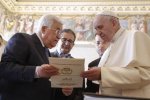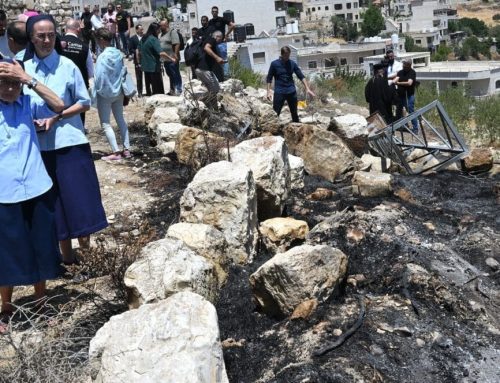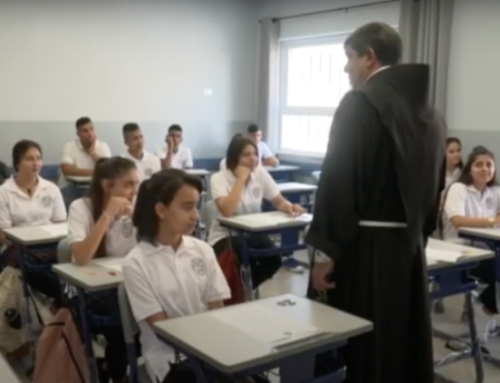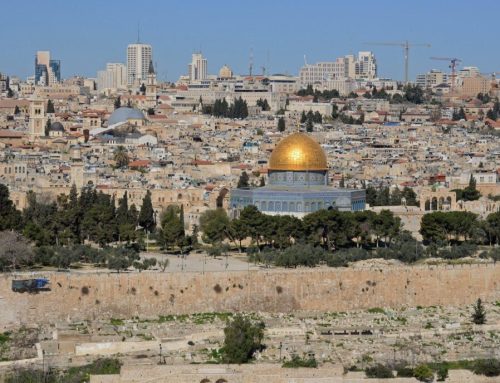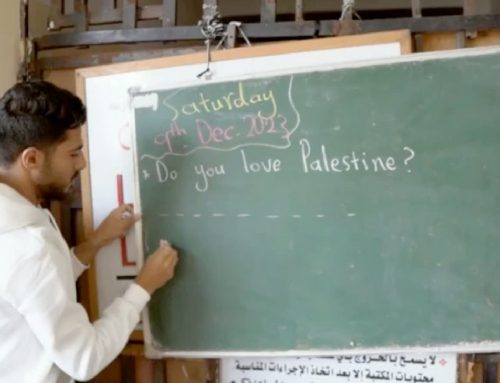The 20-minute meeting was held in a friendly and relaxed atmosphere. For Abbas, the pontiff “loves the Palestinian people and loves peace.” He hopes that other countries will follow the Holy See and recognise Palestine as “an independent state.” Concerns remain over the Holy Places. The Middle East Peace Conference starts tomorrow in Paris. Abbas criticises Trump for his statements on Jerusalem.
Vatican City (AsiaNews) – Pope Francis met this morning with Palestinian president Mahmoud Abbas in a private audience at the Vatican. The meeting, which began at 10.12, lasted 20 minutes in a friendly and relaxed atmosphere, some sources report.
During the tête-à-tête, the Palestinian president said that the “Pope loves the Palestinian people and loves peace.” Mahmoud Abbas told the press afterwards that “The Holy See has recognised Palestine as an independent state, and I hope other countries will follow the Vatican’s example and recognise the Palestinian state.”
In a cordial atmosphere, Pope Francis embraced President Abbas and told him “It is a pleasure to receive you.” The president responded, saying “I am happy to be here.”
The Palestinian leader was accompanied by a delegation of about 15 people, one of whom gave the pope a football jersey with the colours of the Palestine national team and said that he was married to an Argentinean woman.
Before taking his leave, Abu Mazen gave the Pontiff a stone from Golgotha, an icon of the face of Jesus, an icon depicting the Holy Family, a documentary on the restoration of the Basilica of the Nativity, and a book on relations between the Holy See and Palestine.
Pope Francis gave the president the medal for the Jubilee of Mercy as well as a copy of Amoris Laetitia and Laudato Si’, in Arabic.
After the meeting, which follows the June 2015 Global Agreement between the Holy See and the State of Palestine, Abbas made his way to Via di Porta Angelica, a few steps from the colonnade of St Peter, where he inaugurated the Embassy of Palestine to the Holy See.
In his recent address to the diplomatic corps, Pope Francis renewed the Holy See’s appeal for “the dialogue between Israelis and Palestinians towards a stable and enduring solution that guarantees the peaceful coexistence of two states within internationally recognized borders.”
For the pope, who has addressed several times the Israeli-Palestinian issue, “No conflict can become a habit impossible to break. Israelis and Palestinians need peace. The whole Middle East urgently needs peace!”
The statement by the Vatican Press Office goes on to say that the meeting stressed “the importance of safeguarding the sanctity of the Holy Places for believers of all three of the Abrahamic religions. Finally, particular attention was dedicated to the other conflicts affecting the region.
Meanwhile, Israel and Palestine are again at odds on the question of the status of Jerusalem. US President-elect Donald Trump’s announcement that he intends to move the US embassy from Tel Aviv to the Holy City is fuelling tensions. He takes office on 20 January.
Israel claims the whole of Jerusalem, including its eastern section, as its “complete and united” capital.
Based on a two-state perspective, Palestinians claim a part of the city of al-Quds (The Holy) as the capital of the future Arab State of Palestine.
Most members of the United Nations and international organisations do not recognise Israel’s annexation of East Jerusalem and do not consider Jerusalem as the capital of the State of Israel. Most foreign embassies to Israel are located in the coastal city of Tel Aviv.
Palestinian President Mahmoud Abbas yesterday spoke about the US Embassy affair ahead of his trip to Europe, stopping in Rome today to meet the pope, before arriving in Paris for tomorrow’s start of the Mideast Peace Conference.
If President Trump moves the US Embassy to Israel from Tel Aviv to Jerusalem, the Palestinians might consider “reversing recognition” of Israel.
“I wrote to president(-elect) Trump to ask him not to do it,” Abbas told French daily Le Figaro. “Not only would this move deprive the United States of all legitimacy in playing a role in conflict resolution, it would also destroy the two-state solution.”
Trump’s surprise move is bitterly opposed by Palestinians, who see it as a destructive and unilateral action as the status of the city is still contested.
Israel, which has recently boosted its settlement activities in the Palestinian Territories, supports Trump’s plan.
If the embassy transfer does take place, “there would be several options for us, and we would discuss them with Arab countries,” Abbas added.
These options include cancelling the recognition of the State of Israel, one of the few points still in force of the 1993Oslo agreement.
“Reversing our recognition of the State of Israel is on” option, Abbas explained. However, “we hope that it doesn’t reach that point, and that, on the contrary, we will be able to work with the next American administration”.
Source: Asia News

